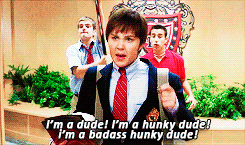In the movie “A Man called Peter”,
Catherine Woods gives the following speech:
This is a speech from one of
my few, favorite movies on earth... it's SO raw and honest. And true.
And no, it's not chauvinistic.
(Catherine Woods gets up to speak at a rowdy youth
rally and is met by claps and cheers from the boys….)
“If that’s because I’m a girl,
thank you boys.
“And now, if you’ll let me,
I’d like to talk as a girl, to the girls here this afternoon. I know if you
boys will listen, they’ll listen too. And I’m just as sure that the reason
they’ve been just as rude and silly as you’ve been, is because they had the
mistaken idea that you wanted them to be.
“I’d never thought much about
being a girl until two years ago, when I learned from a man what a wonderful
thing it is to be a woman. Until that Sunday morning, I considered myself lucky
to be living in the 19th century. The century of progress and emancipation. The
century when, supposedly, we women came into our own. But I’d forgotten that
the emancipation of woman really began with Christianity. When a girl, a very
young girl, received the greatest honor in history. She was chosen to be the
mother of the savior of the world. And when her son grew up and began to teach
His way of life, He ushered woman into a new place in human relations. He
accorded her a dignity she’d never known before, and crowned her with such
glory, that down through the ages, she was revered, protected and loved. Men
wanted to think of her as different from themselves. Better… made of finer,
more delicate clay.
“It remained for the 20th
century, the century of progress, to pull her down from her thrown. She wanted
equality. For 1900 years, she had not been equal. She had been superior. To
stand equal with men, naturally she had to step down. Now, being equal with
men, she has won all their “rights and privileges.” The right to get drunk. The
right to swear. The right to smoke. The right to work like a man. To think like
a man. To act like a man. We’ve won all this, but how can we feel so
triumphant, when men no longer feel as romantic about us, as they did about our
grandmothers? When we’ve lost something sweet and mysterious? Something as, as
hard to describe as the haunting wistful fragrance of violets?
“Of course, these aren’t my
original thoughts. They’re the thoughts I heard that Sunday morning. But from
them, some thought of my own were born. And the conclusion reached, that
somewhere along the line, we women got off the track.
“Poets have become immortal by
remembering on paper a girl’s smile. But I’ve never read a poem rhapsodizing
over a girl’s giggles at a smutty joke. Or I’ve never heard a man brag that his
sweetheart or his wife could drink just as much as he, and become just as
intoxicated. I’ve never heard a man say that a girl’s mouth was prettier with a
cigarette hanging out of it, or that her hair smelled divinely of stale
tobacco.
I’m afraid that’s all I have
to say… I’ve never made a speech before.”
(Catherine Exits; youth rally clapping)
(This isn’t a popular movie, so I
could not find a clip. The only source I could find is another blog.)
This speech is an interesting
address of gender roles because she says that the equality women achieved was a
step-down rather than a step-up for women. I like the way she uses virtue to regard women
as superior to men. However, at the same time she seems to be saying that women
should fulfill a role of “prim and proper.”
I enjoyed viewing this movie's depiction of gender roles- especially because it takes place during the 1900s.










